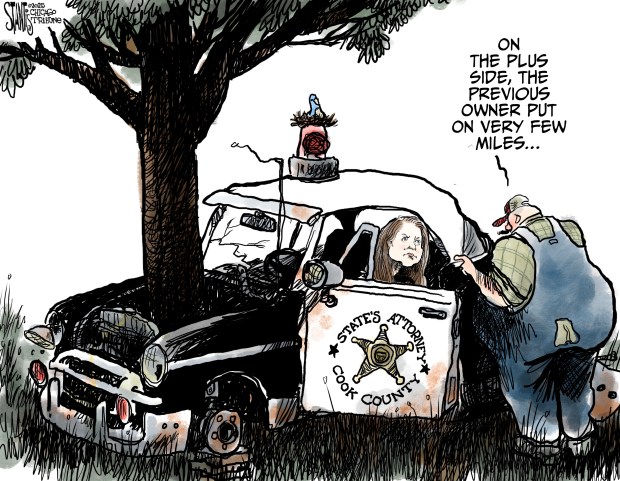The City Council should not approve the proposed $1.25 million settlement to the survivors of Dexter Reed, shot dead last March by Chicago police after he opened fire on them.
This is not to say that all the actions surrounding the traffic stop of the 26-year-old Reed in Humboldt Park on that fateful day were appropriate and shouldn’t be second-guessed. A group of five officers, dressed not in uniform but in tactical clothing and gear, surrounded Reed’s car for reasons that remain unclear (and are still under investigation).
Ordered to get out of his car, Reed refused and instead rolled up his darkly tinted windows. The situation escalated quickly, with Reed shooting at the officers from inside his car and hitting one (thankfully not fatally). Officers opened fire in return, and Reed staggered out of his car and was shot to death.
The Civilian Office of Police Accountability, the agency that investigates allegations of police misconduct and recommends disciplinary action, released the horrifying video within a few weeks. Andrea Kersten, COPA’s chief administrator, then went on an ill-advised media tour in which she shared preliminary conclusions she’d drawn about what the officers had done wrong.
Reed’s family used much of the information Kersten provided in advance of completion of COPA’s investigation in the wrongful-death lawsuit they filed just a few months later. And now here we are, with a proposed settlement readied for council approval and COPA’s probe still not complete! The Finance Committee is scheduled to consider the matter Monday.
Much of the initial criticism of the cops focused on the number of shots they fired in rapid fashion — 96 bullets in 41 seconds, as numerous headlines trumpeted. But the family’s attorney now emphasizes the circumstances of the traffic stop itself, suggesting that an allegedly improper pretext for stopping Reed would have been the plaintiffs’ primary argument in favor of liability.
There are — and have been — reasonable debates to have about the Chicago Police Department’s use of pretextual stops (pulling over cars for minor infractions as a means to search for drugs, guns or both) in neighborhoods populated mainly by minorities. On this subject, CPD Superintendent Larry Snelling has agreed with the critics, at least in part, and has de-emphasized and reduced the number of such stops.
But, even if a stop isn’t justified, we all should be able to agree that police are within their rights to shoot back if someone they’ve pulled over shoots at them first. Police work in Chicago is extraordinarily hazardous duty in a city beset with firearms, many of which are illegally converted via cheap, easily obtainable gadgets into the equivalent of a machine gun.
Paying an excessively large settlement to the survivors of those killed after violently attacking cops sends a few unmistakable messages. In the more immediate sense, the message sent to the officers involved in the Reed shooting, who remain suspended while they await the outcome of COPA’s investigation and the departmental response, is that the city already considers them responsible. That’s inappropriate.
But, more broadly, the message delivered to all the other men and women on our streets putting their lives in jeopardy each day to try to make Chicago safer is that they put their livelihoods and reputations at risk when they use deadly force to protect themselves against someone shooting at them.
In November, Officer Enrique Martinez, responding to a call for help on the South Side, was shot to death from inside a car he had approached. Martinez lost his life in a hail of bullets from one of those illegally converted handguns.
You have to be a cop, or be a loved one of a cop, to understand the bravery required, and the fear that must be overcome, in order to walk up to a car in many Chicago neighborhoods and confront those inside the vehicle. Especially at night, as Martinez had to do.
The argument for settling with Dexter Reed’s family is that paying the costs of defense and risking a judgment might well cost taxpayers considerably more than $1.25 million. That sort of calculation is always a consideration in litigation against those perceived as having deep pockets, whether that’s the nation’s third-largest city or a corporation or a wealthy individual.
But this case strikes us as about more than money. Sometimes a principled stand is in order.
We have a Police Department that appears to be starting to get its footing back after cops were castigated in far too many corners of this city during the reckoning following George Floyd’s murder at the hands of a Minneapolis police officer in 2020. We seem to be heading toward an appropriate middle ground between “backing the blue” no matter the facts, which dominated for decades, and the “defund the police” madness that ensued in more recent times. Surely, it’s possible to hold police accountable for wrongdoing or terrible mistakes while also supporting them when they act reasonably in the face of mortal danger.
“Where is our line in the sand?” Ald. Anthony Napolitano, 41st, told the Chicago Sun-Times. “These officers were fired upon. One of them was hit. … You can’t Monday-morning-quarterback that. It’s next to impossible unless you’re gonna put robots on the street.”
When you shoot at police officers, you bear at least most of the responsibility for what happens next. And the next time police shoot and kill someone who shoots first at them, how will the city defend itself from that lawsuit, having capitulated in this one?
Since the mayor’s Law Department isn’t going to do it, the City Council should draw that line in the sand and reject the settlement.
Submit a letter, of no more than 400 words, to the editor here or email letters@chicagotribune.com.



